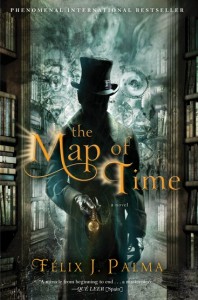By Nick Elliot
Signal Book Critic
“The Map of Time”
Already an international bestseller, Felix J. Palma’s time traveling novel, “The Map of Time,” arrives stateside with this thoroughly imaginative first entry in a planned trilogy.

Set in Victorian London, the novel is written in three parts. The first follows the lovesick and affluent Andrew Harrington on a quest to go back in time to prevent his lover’s murder by Jack the Ripper. In the second part, Claire Haggerty is swept into a love affair with Captain Shackleton, a hero from the future who saves the world from destruction in the year 2000. Inspector Garrett is at a loss to solve a murder mystery in which each victim is found with a gaping hole in their chest, a wound inexplicable in Victorian technology, in the final part.
A fictional H. G. Wells is one of the novel’s primary characters. He is sought out as an expert in time travel after the publication of “The Time Machine.”
Palma weaves an entertaining, genre-bending tale that fully immerses the reader in a different time and place. The novel is fairly complex in terms of plot, but in general Palma does an excellent job of managing the story and maintaining its excitement. Non-science fiction readers often feel like they need a “Time Travel for Dummies” guide to follow the specifics of the phenomenon. Here, Palma does a commendable job explaining the subject while keeping the narrative interesting. If anything, the novel runs a bit long and would benefit from a more compact plot. Nevertheless, “The Map of Time” holds the reader captive in a feat of storytelling.
By Chris Delaney
Signal Book Critic
“Lying”
I would normally take pleasure in recommending Sam Harris’s new book, “Lying,” to anyone reading this review, but to do so would ignore what is substantial in this text. Sam Harris contends that “lying, even about the smallest matters, needlessly damages personal relationships and public trust.” He believes that ewhite lies or withholding information can negatively impact others in ways we normally wouldn’t consider. Eliminating such superficial lies and allowing ourselves to be subject to a more truthful reality could benefit mankind. And in defending this contention, Harris repeatedly points out information which most people genuinely know but are reluctant to admit to themselves.
Harris brings an interesting take on lying which inspires one to ruminate on one’s own lies.
This short book, which is more of an essay, is available on Amazon for $2 and is definitely worth the price; however, it lacks the bite and normal worldview-altering prose of his other works. If you are already a fan of this neuroscientist’s work, it might be worth the read, if only because it is so short. If you have never read anything by Harris, I recommend first looking into his earlier works such as “Letter to a Christian Nation,” “The Moral Landscape” or “The End of Faith.” “Lying” does not do justice to Harris’s usual standard of work.






